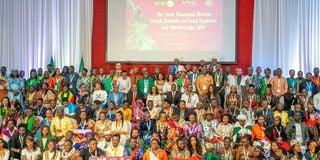African youth call for sustainable food systems as Kenyans push for seed sovereignty

African youth meet in Addis Ababa, Ethiopia on October 14 to brainstorm and propose innovative solutions to address challenges facing the continent’s food systems.
What you need to know:
- The sharing of indigenous seeds has been made a criminal offence by Kenya’s law through the ‘Seed and Plant Varieties Act Cap 326'.
At least 1,000 young people from 50 African countries, including Kenya, met this week in Addis Ababa, Ethiopia to brainstorm and propose innovative solutions to address challenges facing African food systems in the changing climatic conditions.
“Apart from the climate crisis, one of the major challenges the continent is facing is interference by foreign cooperate entities that have captured and commercialised African food systems, and are seeking to interfere with seed sovereignty of the continent,” said Kirubel Tedele, a youthful Ethiopian Pan-African who is committed to environmental, social justice, and human rights causes in Africa.
His sentiments were echoed by Claire Nasike, an agroecologist and the founder of the Humming Bird Foundation, who quoted the former Burkina Faso Prime Minister Thomas Sankara: ‘He who feeds you, controls you.’
“Control starts from seed,” said Ms Nasike. “When international companies or scientists use African seeds to crossbreed them into (patented) hybrid varieties, they are actually robbing the sovereignty of African seeds, and by extension, African food systems,” she said.
This comes at a time when Kenyan farmers are battling with the government in courts over an unpopular law that seeks to punish farmers with a jail term of up to two years or a fine of Sh1 million for sharing indigenous seeds among themselves without certification or registration.
The sharing of indigenous seeds has been made a criminal offence by Kenya’s law through the ‘Seed and Plant Varieties Act Cap 326,’ which is meant to regulate seed usage among local farmers in the country. The Act threatens to imprison farmers for sharing, selling, or exchanging indigenous seeds.
As a result, 15 farmers from different parts of the country filed a lawsuit against the seed law, arguing that the Act is in direct contradiction with the farmers’ rights enshrined in the Kenyan Constitution and an obstacle to the development of their activities and livelihoods.
In the same vein, vegetable and fruit farmers and traders may soon lose freedom of growing their crops or selling vegetables and fruits in the local markets should the 2024 Horticultural Crops Authority Bill, proposed by nominated MP Sabina Chege, go through.
Should it become law, farmers and people who sell vegetables and horticultural products in the local market (mama mboga) as well as dealers in the international markets will be forced to obtain licences from the newly established Horticultural Crops Authority or respective county governments every year for them to continue with their activities.
The certificates of registration will only be issued to an applicant who fulfills the registration requirements prescribed in the regulations. According to the bill, violators of the provisions will face severe penalties, including fines up to Sh1 million or imprisonment for up to three years, or both.
According to Kilimo Cha Haki movement, the new laws in the agricultural sector will impose unnecessary restrictions and infringe on the rights of small-scale farmers across the country.
To this end, participants at the Addis Ababa youth summit are calling for all young farmers across the continent to take interest in legal systems, through which they can keep lawmakers in check as well as help in developing policies that support food sovereignty on the continent.
“We are seeking agricultural freedom, food and seed sovereignty on the continent through farming techniques such as agroecology, which are acceptable to African communities and resilient to climate change,” said Simon Bukenya, the programme officer at the Alliance for Food Sovereignty in Africa (AFSA).
The Kampala-based AFSA was the convener of the Addis Ababa summit dubbed a ‘Thousand African Youth Summit on Food Systems and Agroecology,’ which was designed to generate innovative ideas, practical recommendations, and actionable plans to address the complex issues facing African food systems.
“Indigenous seeds, resilient by nature, are the cornerstone of crop diversity and our defence against water and food scarcity and changing climate,” said Elizabeth Atieno, Food Campaigner at Greenpeace Africa. “Embracing them paves the way for sustainable food systems,” she said, noting that African countries should actively encourage indigenous seed sharing and not restrict the same.
According to AFSA, outcomes of the summit will serve as tangible tools and resources for youths, governments and organisations to initiate concrete actions that promote sustainable food systems, empower youth in agriculture and advance the adoption of agroecology practices.





